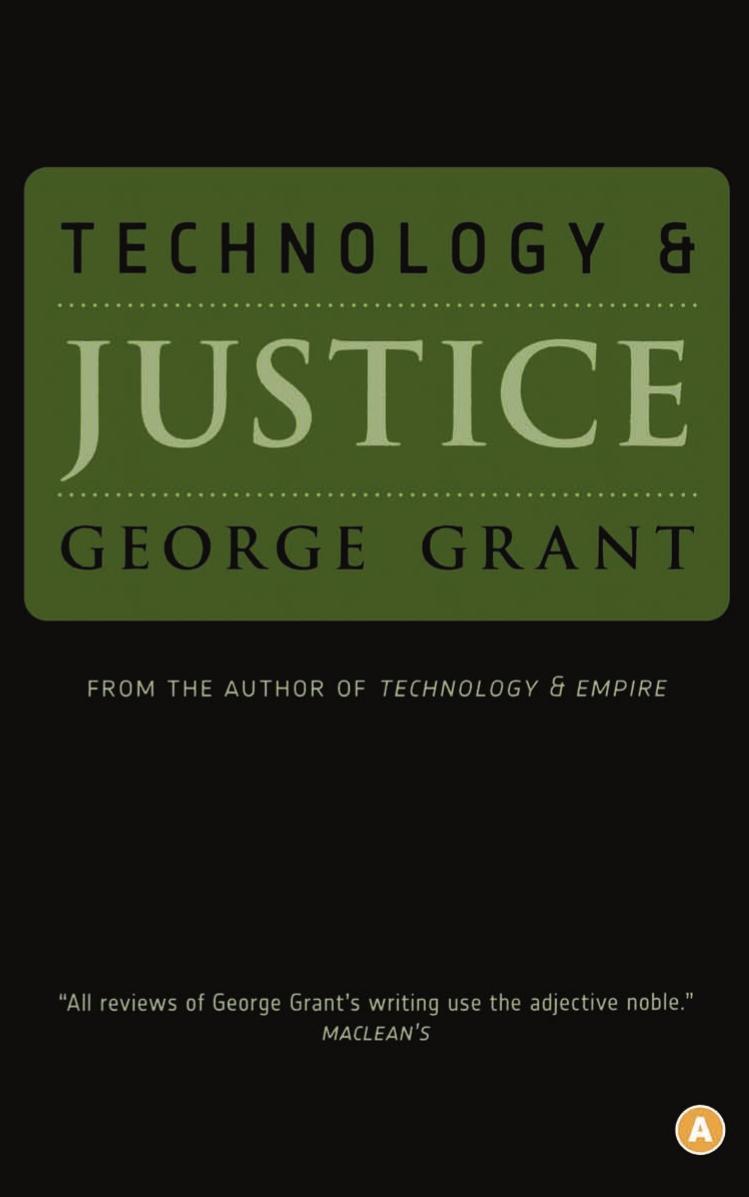Technology and Justice by George Grant

Author:George Grant
Language: eng
Format: epub, pdf
Tags: LAW099000
Publisher: House of Anansi Press Inc.
Published: 1991-08-31T16:00:00+00:00
Appendix
Questions about the history of thought arise concerning this writing. (1) Why ‘use’ the language of a great philosopher—in this case Plato —to describe Christianity, when the Gospels are little concerned with philosophy? (I put the word ‘use’ in quotation marks because philosophy always uses the user rather than he or she using it.) (2) Is it not absurd and antiquarian to write now of Christianity in the language of an ancient philosopher (albeit the greatest)? Would it not be wiser to ‘use’ the language of a modern philosopher?
(1) The permutations and combinations of the relations that have been between Christianity and philosophy could make up a whole history of the western world. It is not my business to write ten or more volumes about the history of those permutations and combinations. To speak of them elementarily: it is clear that Christianity is as much “the practice of dying” as Socrates said that philosophy was. When we turn to either we come quickly upon the two great deaths which stand at the origins of western life and thought. Yet these two deaths are very different. The calm, the wit, the practice of thought which are present at Socrates’ death may be compared with the torture, the agony, the prayers, which are present in Christ’s death. Just before drinking the hemlock Socrates makes a wonderful joke; in Gethsemane Christ’s “sweat was, as it were, great drops of blood falling to the ground’. Indeed the difference is also stated in the fact that where Socrates’ wife is absent for most of Phaedo, the two Marys stand beneath the cross.
Yet it is apposite that in his attempt to invert Platonism and to mock Christianity Nietzsche should have said: “Christianity is Platonism for the people.” The greatest nineteenth-century thinker was right to understand that the establishment of the highest modernity required not only the liberation of the west from Christianity, but also from Platonism, because of the deep connection between the two. At the beginning of his exoteric work, Beyond Good and Evil, this aphorism lays down the closeness between Christianity and Platonism. It can free the mind from all the nonsense of the assumption, in so much Biblical scholarship, that the achievement of such doctrines as the Incarnation and the Trinity were just mistakes of the Church fathers because they had wanted to Hellenise the Gospels. However much Christ’s life and death and resurrection were the events of divinity, human beings had to think their relation to other events. Because Platonism asserts the primacy of Goodness itself, it was considered the best language for this task.
The close connection between Socrates and Christ lies in the fact that Socrates is the primal philosophic teacher of the dependence of what we know on what we love. In the central books of The Republic, Plato uses the image of the sun, the line and the cave to write of the journey of the mind into knowledge. In those images sight is used as a metaphor for love.
Download
This site does not store any files on its server. We only index and link to content provided by other sites. Please contact the content providers to delete copyright contents if any and email us, we'll remove relevant links or contents immediately.
| Automotive | Engineering |
| Transportation |
Whiskies Galore by Ian Buxton(42014)
Introduction to Aircraft Design (Cambridge Aerospace Series) by John P. Fielding(33128)
Small Unmanned Fixed-wing Aircraft Design by Andrew J. Keane Andras Sobester James P. Scanlan & András Sóbester & James P. Scanlan(32800)
Craft Beer for the Homebrewer by Michael Agnew(18245)
Turbulence by E. J. Noyes(8047)
The Complete Stick Figure Physics Tutorials by Allen Sarah(7372)
The Thirst by Nesbo Jo(6944)
Kaplan MCAT General Chemistry Review by Kaplan(6933)
Bad Blood by John Carreyrou(6621)
Modelling of Convective Heat and Mass Transfer in Rotating Flows by Igor V. Shevchuk(6440)
Learning SQL by Alan Beaulieu(6289)
Weapons of Math Destruction by Cathy O'Neil(6279)
Man-made Catastrophes and Risk Information Concealment by Dmitry Chernov & Didier Sornette(6019)
Digital Minimalism by Cal Newport;(5764)
Life 3.0: Being Human in the Age of Artificial Intelligence by Tegmark Max(5558)
iGen by Jean M. Twenge(5415)
Secrets of Antigravity Propulsion: Tesla, UFOs, and Classified Aerospace Technology by Ph.D. Paul A. Laviolette(5371)
Design of Trajectory Optimization Approach for Space Maneuver Vehicle Skip Entry Problems by Runqi Chai & Al Savvaris & Antonios Tsourdos & Senchun Chai(5068)
Pale Blue Dot by Carl Sagan(5007)
